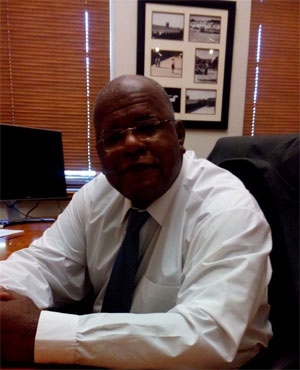
The truth about most matters is something that has become surprisingly hard to find.
We sift through article after article and tweet after tweet, trying to figure out who is right and what the actual facts are amid a sea of alternative facts, PR spin and biased opinions.
The unbridled truth has become so rare that we are often shocked when someone gives it to us straight, which is exactly why Prof Jonathan Jansen has become known as the controversial figure that he is.
Today he is sitting at his publisher’s boardroom table for our interview and seems tired of having to repeat the same message again: If we don’t change course, our universities, and our country, are in big trouble.
“One of my tasks is to tell people the truth as I see it. My entire career is about studying careers and universities. So when I tell you this is what’s happening, I’ve been studying it and watching the trends. The same forces that took down universities in other African countries are at play in South Africa,” he explains.
“South Africans have this habit of thinking we’re exceptional. We’re not exceptional.
“So I thought I should sketch the dilemma that institutions are institutions, and we face those same problems.”
Jansen’s latest book, As by Fire, is based on his personal experience as vice-chancellor of the University of the Free State, in conversation with eleven other vice-chancellors. It is his attempt to “capture the ambition and anxiety of leadership practice during a period of sustained crisis”, as he explains in the book.
“Most people who became vice-chancellors were professors; leaders in their disciplines. They were researchers and scholars, not crisis managers or people who had to interface between police and students. That was a huge shock,” he explains.
“We underestimated the cultural shift that took place at universities in terms of what is now allowable in protest culture and in politics on campuses.”
Jansen, who currently resides in Cape Town after a stint at Stanford University, is highly critical of what he describes as a “culture of unreason” among students that to a large extent made the student crisis of 2015/16 unmanageable. The root of this unreason, he says however, has very much to do with the inability South African universities developed over the past decade to engage students.
“Teaching in South Africa has been reduced to notes. Students come to class and say, just give me the notes: ‘Just tell me how I can pass.’ That’s nonsense. What we’ve been doing is to give students answers because they demand answers and you have an exam to get passed. But they know nothing. All they know is how to pass.”
So Jansen wasn’t at all surprised that when it came to the politics of protest, no one seemed to be able to engage the students.
“Because they were right and everybody else was wrong. And that was that. And so in that context you get words being used that have no meaning whatsoever in describing their dilemma.”
This raises the broader issue that if universities can’t even teach at a level that engages students, what happens to their duty to better educate the public?
Jansen believes you can see it in the lack of depth in our public discourse.
“When somebody puts on the table a term like radical economic transformation, I expect social scientists to say, wait, let’s unpack this. What does this mean? Where does it come from? We don’t do that. We just swallow the stuff.”
This is exactly how former president Thabo Mbeki got the country into trouble by questioning the efficacy of anti-retroviral drugs, Jansen argues.
“When somebody says ‘white monopoly capital’, that’s a powerful term in a constitutional democracy. It’s this recklessness of words and agendas that lie beyond scrutiny that adds to the mess. I hold academics accountable. Many of them just follow. Partly because of guilt, partly because of fear. They just follow and swallow the stuff, without asking, what does it mean?”
That’s exactly why a student can get up in class and basically question the laws of gravity without anyone setting him straight.
With an exasperated chuckle, Jansen says: “I don’t know, sometimes I think our country has gone crazy.
“A man is burnt alive inside his car because he’s driving an Uber in Gauteng. A woman and her children in the Eastern Cape die in a shack fire. Where’s the public outrage? You know? We’re fighting about who said what in Business Day. We need to be outraged about the right things.”
Is everyone else perhaps just as “bruised and defeated” by South Africa’s many challenges, as one reviewer accused Jansen of being?
He laughs off the notion. It seems that when you’re in the kind of environment South Africa is at the moment, you will be controversial no matter what you say.
“You will get called names if you don’t follow the party line. I don’t think that is something that any scholar should be scared of. It comes with the territory. You can be called names, you can be threatened. I think we need to remain true to our profession which is to ask, is this the truth or not? Is this helping us or hurting us? Is this helping the plight of the poor or not?
“Most South Africans, black and white, just want our country to work for all our people. So if in the process of doing that you get called names, you get threatened and all of that, I don’t think we should give in to that. We should forge ahead.”




 Publications
Publications
 Partners
Partners























